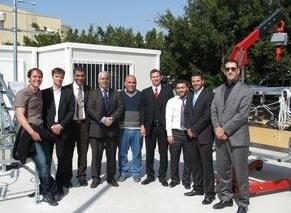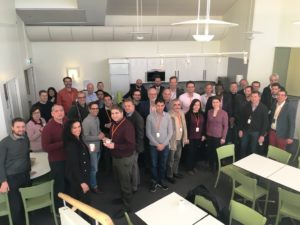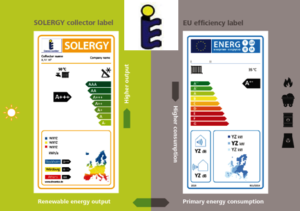Lebanon: Successful Installation of Testing Equipment
November 2, 2012
 The new test facility for solar thermal collectors at the Industrial Research Institute (IRI) in Beirut, Lebanon, is now in its warm-up phase: At present, the technical team is preparing the collector testing for the upcoming ARSOL certification scheme in the Middle East and North Africa (MENA) region. The photo shows the partners responsible for setting up the equipment according to European collector standards EN 12975 1 and 2 (from right to left): Pierre El Khoury (Lebanese Center for Energy Conservation, LCEC), Rani Al Achkar (LCEC), Nader Hajj Shehadeh (LCEC), Christian Schorn (Institute for Future Energy Systems, IZES), Sheikh Talal Zaki (IRI), Imad Hage Chehade (IRI), Mohamed El-Hajjar (IRI), Dino Alexopoulos (CRES) and Andreas Gisch (IZES). The photo was taken during the last project meeting in April 2011.
The new test facility for solar thermal collectors at the Industrial Research Institute (IRI) in Beirut, Lebanon, is now in its warm-up phase: At present, the technical team is preparing the collector testing for the upcoming ARSOL certification scheme in the Middle East and North Africa (MENA) region. The photo shows the partners responsible for setting up the equipment according to European collector standards EN 12975 1 and 2 (from right to left): Pierre El Khoury (Lebanese Center for Energy Conservation, LCEC), Rani Al Achkar (LCEC), Nader Hajj Shehadeh (LCEC), Christian Schorn (Institute for Future Energy Systems, IZES), Sheikh Talal Zaki (IRI), Imad Hage Chehade (IRI), Mohamed El-Hajjar (IRI), Dino Alexopoulos (CRES) and Andreas Gisch (IZES). The photo was taken during the last project meeting in April 2011.
Photo: IZES
The overall objective of the IRI is to establish and secure consumer safety by protecting the Lebanese market from counterfeit or sub-standard products. The new test lab could help improve products further and may play an important role in future product and system innovations. The lab’s primary aim is to implement a test series according to the following European standards:
- EN 12975 – 1: Thermal solar systems and components – Solar collectors – Part 1: General requirements
- EN 12975 – 2: Thermal solar systems and components – Solar collectors – Part 2: Test methods
The facility has also been designed and set up in a way that IRI can apply for accreditation pursuant to DIN EN ISO/IEC 17025. The project costs were partially covered by funds from the Hellenic Aid programme. The project was jointly managed by the Greek Centre for Renewable Energy sources and Saving (CRES) and the United Nations Development Programme in Lebanon (UNDP). The test lab includes a sun-tracking test stand for thermal performance tests, a stand for testing the durability and reliability of solar collectors, another one for mechanical load tests and a meteorological station to monitor environmental conditions.

Presenting the test facility during a workshop in April 2011
Photo: IZES
Several institutions joined forces to set up the installation at the Industrial Research Institute (IRI):
- First, there is IZES, which is a German non–profit institute for renewable energy. The institute’s team of solar experts at the solar test lab TZSB in Germany develops testing facilities and acts as an international consultancy for solar thermal energy. The system had been designed and pre-assembled at the IZES at the beginning of August 2010. The equipment, components and instruments were delivered to their final location at the end of March 2011. Commissioning took place in early April 2011 under the supervision of IZES.
- National organisation LCEC is an affiliate of the Lebanese Ministry of Energy and Water. The Center addresses end-user energy conservation and renewable energy at the national level. Among other things, the institute promotes and develops the ambitious Lebanese solar water heater programme by the UNDP, which requires the installation of 1.05 million m² of solar panels until 2020.
- The IRI is a Lebanese institution for studies, industrial research, and scientific testing and analysis. It is a non – profit institution with fourteen different laboratories, of which some have received an internationally accreditation.
At the IRI, engineers from both Lebanon and Germany worked together to acquire initial measurements with the data acquisition system, the installed sensors and the individual test rigs. Two collectors were also installed in April 2010 in order to underline the testing lab’s commitment to measuring under real conditions and to offer IRI employees training courses which would deal with real-life situations.
More information:
Industrial Research Institute: http://www.iri.org.lb/
LCEC: http://www.lcecp.org.lb/index.php
IZES / TZSB: http://www.izes.de/tzsb/mainpage.html
The text was written by Rani Al Achkar from the Lebanese Center for Energy Conservation (rani.alachkar@lcecp.org.lb) and Christian Schorn from the Institute for Future Energy Systems (schorn@izes.de).


